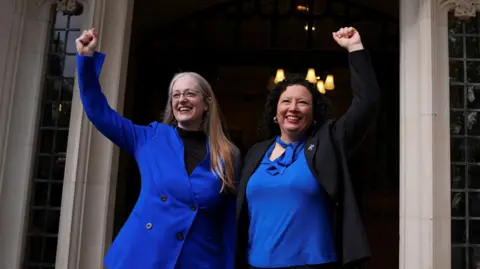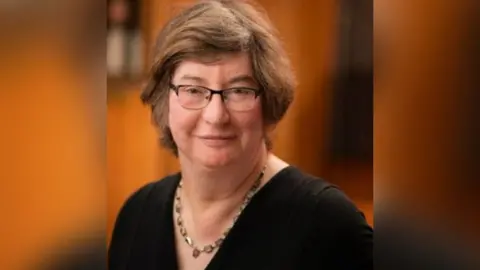Ruling on gender equality divides opinion
 Reuters
ReutersPeople in Somerset are divided over the UK Supreme Court ruling that a woman is defined by biological sex under equalities law.
On Wednesday the court unanimously voted in favour of campaign group For Women Scotland, which brought a case against the Scottish government arguing that sex-based protections should only apply to people that are born female.
Emma Thomas, part of the women's rights network in Somerset and Dorset, said the ruling was a "massive victory".
But Robin White, a Somerset lawyer who is trans, said: "It's a wrong interpretation of the law and what it will do is have a number of unintended consequences."
Supreme Court judges ruled that when the term "woman" is used in the Equality Act it means a biological woman, and "sex" means biological sex.
This means a Gender Recognition Certificate (GRC) - a legal document that recognises an individual's gender identity - will now not change a person's legal sex for the purposes of the Equality Act.
Women 'made unsafe'
Ms Thomas told BBC Radio Somerset that women have been "made unsafe" in recent years.
"You can go get a bra fitted and a man can be there in the cubicle next to you," she added.
"That's something that has concerned women."
However, Ms White is worried the ruling will have "unintended consequences".
"There are many more masculine-looking women than trans people in our society, and it's those women who are going to be challenged.
"It's an unhelpful result and it will cause complexity rather than clarity," she said.
What happened in court?
The legal arguments centred on whether trans women with gender recognition certificates (GRC) should be treated as women by the Equality Act.
Only few trans people have GRCs, which legally recognises an individual's acquired gender.
The Scottish government argued that a transgender person with a GRC should have the protections of that acquired gender.
However, For Women Scotland argued that these protections should only apply to people born female.
The judgement concluded if people with GRCs were treated differently to those who do not have certificates, it would create an "unworkable two-tier system of protections" for the group.
 Robin White
Robin White'Permitted discrimination'
There is already Equality Act guidance which allows for women-only spaces, such as toilets, changing rooms and hospital wards in certain circumstances.
But under the new ruling a person who was born male but identifies as a woman does not have a right to use a space or service designated as women only.
When asked whether she worries about trans people's safety, Ms Thomas said: "People are still protected against discrimination. It doesn't give you an automatic right to enter women's spaces.
"Maybe men need to be more accommodating in their spaces towards non-conforming men."
Ms White said the ruling will "only affect a small number of trans people".
"It may be much less change than many people think," she told BBC Radio Somerset.
"For example in the NHS, to insist that trans women will be put on a male ward, would be discriminatory against them on the basis of their protected characteristic of gender reassignment.
"These things tend to trigger behaviour from people who don't really understand the circumstances.
"I'm always concerned that a group thinks that what we've got is permitted discrimination and that they can go out and act inappropriate towards anyone."
Follow BBC Somerset on Facebook and X. Send your story ideas to us on email or via WhatsApp on 0800 313 4630.
